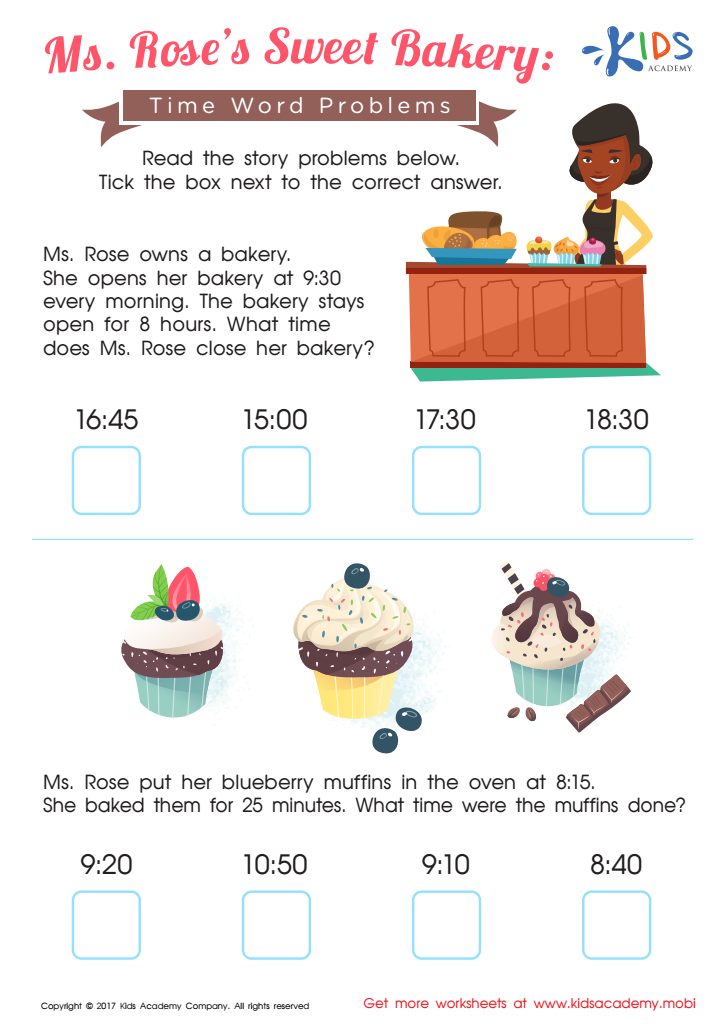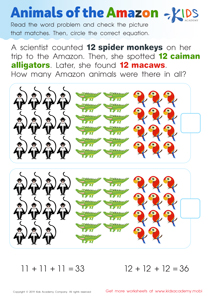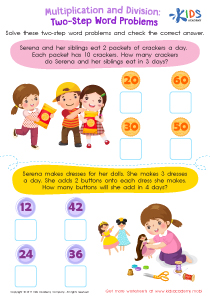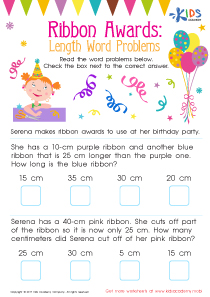Extra Challenge Time Word Problems Worksheets for Ages 3-5
1 filtered results
-
From - To
Introducing our Extra Challenge Time Word Problems worksheets, specially designed as learning homework sheets for children aged 3-5 years. These engaging worksheets are perfect for young learners to develop their problem-solving skills through fun and interactive time-themed challenges. Each sheet is crafted to build foundational math skills, encourage critical thinking, and enhance time management abilities in preschoolers. With vibrant illustrations and clear, age-appropriate instructions, our worksheets make learning an exciting adventure for little ones. Set your child up for success with this essential educational tool that makes every learning moment count!


Ms. Roseв's Sweet Bakery Time Worksheet
Extra Challenge worksheets on Time Word Problems are an invaluable resource in the educational journey of young children aged 3 to 5 years. These educational worksheets are meticulously designed to not only introduce little ones to the concept of time but also to enhance their problem-solving skills, critical thinking, and mathematical reasoning. This foundational groundwork is pivotal in preparing them for more complex concepts as they advance in their learning stages.
Firstly, these educational worksheets serve as an engaging platform to grasp the basics of time. At the tender ages of 3 to 5, children are just beginning to notice the daily rhythms of life, such as day turning into night, meal times, and bedtime routines. Time Word Problems worksheets incorporate these familiar elements, making the abstract concept of time more relatable and understandable. By presenting time in contexts that are familiar to young children, these worksheets make learning both fun and relevant.
Moreover, Extra Challenge worksheets are crafted to cater to the varying levels of understanding and ability within the age group of 3 to 5 years. They are designed to challenge young minds at just the right level, providing a gentle introduction to the notions of hours, minutes, and seconds without overwhelming them. This fosters an environment where learning is seen as an enjoyable and rewarding experience, rather than a daunting task.
The structure of Time Word Problems in these educational worksheets also promotes critical thinking and problem-solving skills. Children are encouraged to read (with assistance, as needed), comprehend the problem presented, and figure out the solution by applying their nascent knowledge of time. This process is crucial in developing their cognitive abilities and helps in enhancing their analytical skills. Each worksheet typically follows a progression, starting from very simple problems and gradually introducing slightly more complex scenarios as the child's understanding deepens.
Interactivity is another significant benefit of these worksheets. Many of them include colorful illustrations and are often accompanied by tools such as clocks with movable hands. This tactile component allows children to physically engage with the concept of time, making the learning experience more immersive and effective. Interactive learning tools are known to aid memory retention and can help children recall and apply what they have learned in real-life situations.
Furthermore, the use of Time Word Problems worksheets encourages the development of mathematical language and terminology at an early age. Terms like ‘earlier’, ‘later’, ‘next’, and ‘before’ introduce children to temporal sequencing. This not only aids their mathematical reasoning but is also beneficial in developing their language skills and ability to follow instructions.
In addition to the educational value, Extra Challenge worksheets on Time Word Problems provide a wonderful opportunity for parent-child bonding. Engaging in these worksheets together allows parents to actively participate in their child's early education. This involvement is crucial as it reinforces learning at home, provides children with confidence and support, and gives parents insight into their child’s developmental progress and areas that may need additional attention.
Parents and caregivers can also use these moments to extend learning beyond the worksheets. For instance, after completing a worksheet, they might ask the child to apply what they've learned by telling the time during various daily activities like lunchtime or bedtime. This practical application ensures that the abstract concepts learned from the worksheets are connected to real-world scenarios, enhancing understanding and retention.
Additionally, incorporating educational worksheets like these into daily routines helps establish and reinforce consistency and discipline in young learners. The regular practice of sitting down to solve a worksheet instills good study habits from an early age, setting the stage for a lifelong love of learning.
Lastly, these worksheets are also an excellent tool for educators in preschool settings. They can be used as part of a structured curriculum or as supplementary material to reinforce lessons taught in class. For teachers, the worksheets provide a clear, measurable way to assess individual understanding and progress in the concept of time, allowing for tailored educational approaches to meet the needs of each child.
In conclusion, Extra Challenge worksheets on Time Word Problems are more than just educational activities; they are a comprehensive tool designed to enhance intellectual development, encourage practical learning, and foster an engaging and supportive learning environment. By integrating these worksheets into early education, we lay a solid foundation not only in mathematics but in critical life skills that will benefit children far beyond their initial school years.
 Assign to the classroom
Assign to the classroom











